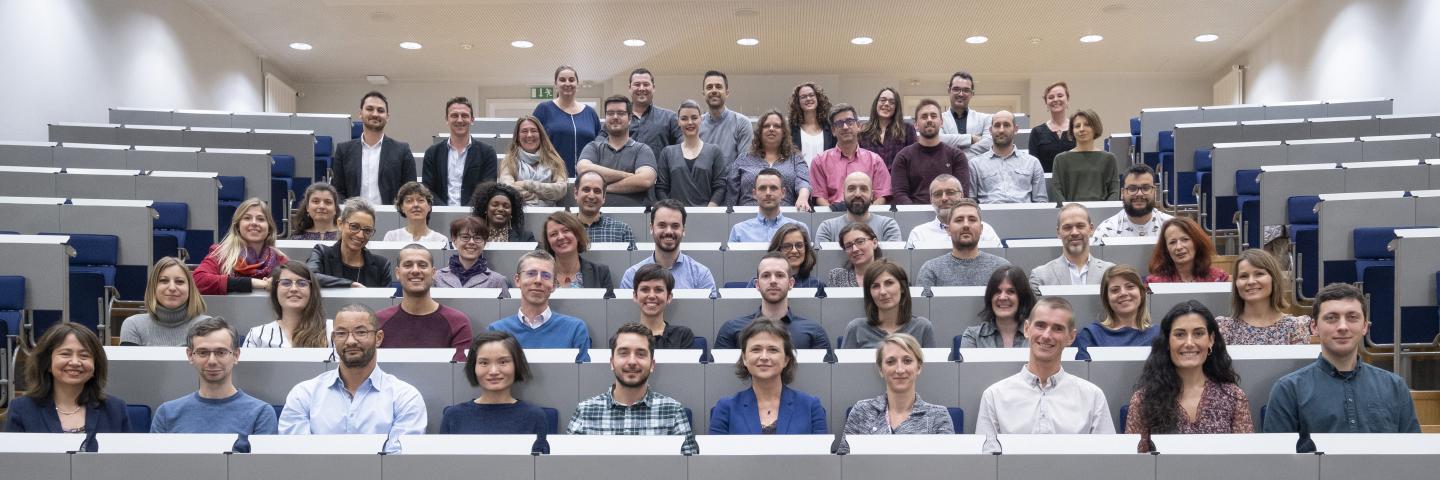Luxembourgish expertise in Digital Health recognised at the international level

Credit: Copyright LIH
As the first pandemic in the digital era, COVID-19 has created an urgent need for coordinated mechanisms to respond to the outbreak across health sectors. While digital health solutions have been identified as promising approaches to address this challenge, their successful implementation depends on a series of socio-economic, ethical, legal and cultural factors and requires the appropriate enabling expertise, infrastructure and cohesion among all stakeholders concerned. Through the adoption of several digital health solutions, Luxembourg is positioning itself as a leader in this respect, both from a public health surveillance and a research perspective. Dr Guy Fagherazzi, Research Leader in “Digital Epidemiology and E-health” and colleagues from the Department of Population Health of the Luxembourg Institute of Health (LIH) released an editorial on June 16th reviewing international digital responses to the pandemic – including the “Predi-COVID study” – and providing recommendations and guidelines for future digital initiatives. Published in the prestigious Journal of Medical Internet Research, the paper was selected as a featured editorial for the launch of a dedicated article series on COVID-19.
Digital tools can effectively support institutions during a pandemic by allowing the deployment of novel digital healthcare models at different stakeholder levels — from healthcare and research, to the government and general population. Telemedicine solutions, mobile applications, websites and “chatbots” are enabling the provision of virtual medical visits and primary care, electronic prescriptions, remote patient monitoring and screening in real time, risk assessment and triage prior to hospital admission, as well as the immediate widespread dissemination of information through digital communication campaigns. Moreover, digital tools, open search engines and social media platforms constitute useful resources to rapidly collect meaningful information on large samples and study the evolution of symptoms in real time, thereby increasing the understanding of the different clinical profiles of COVID-19 patients, the evolution of the pandemic and the long-term health consequences of the disease.
Leveraging on the interdisciplinary expertise of all national healthcare and biomedical research players, the prospective cohort study “Predi-COVID ” was recently established to identify important risk factors and biomarkers associated with COVID-19 severity. The study boasts an innovative design, underpinned by a strong digital component relying on a series of tools collaboratively developed and implemented by the Predi-COVID consortium partners. Specifically, the recruitment of participants in Predi-COVID is made possible by the close collaboration between the LIH and the Health Directorate of the Luxembourg Ministry of Health, in charge of the national telemonitoring system “suivicovid.lu” for the remote surveillance of all patients who tested positive for COVID-19 and for the evaluation of the evolution of their symptoms and health condition. Clinical and epidemiological data is then combined with the collection of biological samples and associated data, electronic patient-reported outcomes and additional digital data gathered through the innovative “CoLive LIH” smartphone application. “CoLive LIH” was conceived by the LIH Department of Population Health (DoPH) to mainly capture vocal data to identify innovative digital vocal biomarkers to monitor patients with COVID-19.
“Voice recordings in particular will allow us to identify and study specific signatures in patients’ voices – so-called vocal biomarkers – that can be associated with frequently observed COVID-19 symptoms, such as respiratory syndromes, fatigue, but also anxiety or negative emotions, and which could enable the easy remote monitoring of COVID-19 patients at home”, explains Dr Guy Fagherazzi, corresponding author of the publication.
From a technological standpoint, the current pandemic has acted as an accelerator of new “e-Health” solutions. Nevertheless, there is a strong need for a concerted, streamlined action and better cohesion — at the international level — to ensure collected data is harmonised, reproducible and reliable. “The suddenness of the COVID-19 pandemic meant that new digital solutions had to be developed and rolled out rapidly. This reactivity stimulated creativity and innovation, but also raised new organisational challenges. Digital solutions should focus on easing the life of those who are at the forefront of the crisis and providing data to evaluate their effectiveness to support evidence-based public health decisions”, underlines Prof Laetitia Huiart, head of the Department of Population Health at LIH and co-author of the paper. “Luxembourg has done very well on this aspect too”, she adds.
Indeed, the Luxembourg Ministry of Health and its Health Directorate have been working in close cooperation with the main research institutes to build synergies in terms of COVID-19 surveillance and research, ensuring a smooth coordination between the country’s healthcare and research activities. “To this end, the dual role of Prof Laetitia Huiart as both the Principal Investigator of Predi-COVID at LIH and as the leader of the ‘Inspection Sanitaire’ at the Ministry of Health has been crucial in fostering data sharing and ensuring that COVID-19 monitoring and research in Luxembourg go hand in hand through the effective implementation of novel ‘e-Health’ tools”, Guy Fagherazzi concludes.
The original article was published on June 15th 2020 in the Journal of Medical Internet Research, with the full title “Digital Health Strategies to Fight COVID-19 Worldwide: Challenges and Recommendations”. The article was selected as an editorial for the launch of a dedicated article series on COVID-19, with Dr Fagherazzi acting as a Guest Editor.
###
Media Contact
Arnaud D’Agostini
[email protected]
Original Source
https:/
Related Journal Article
http://dx.





